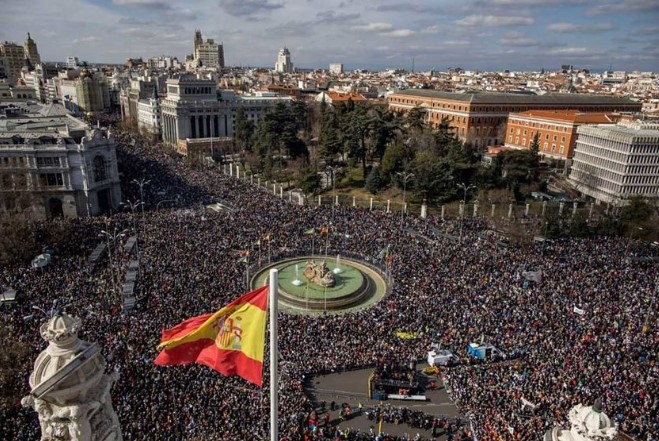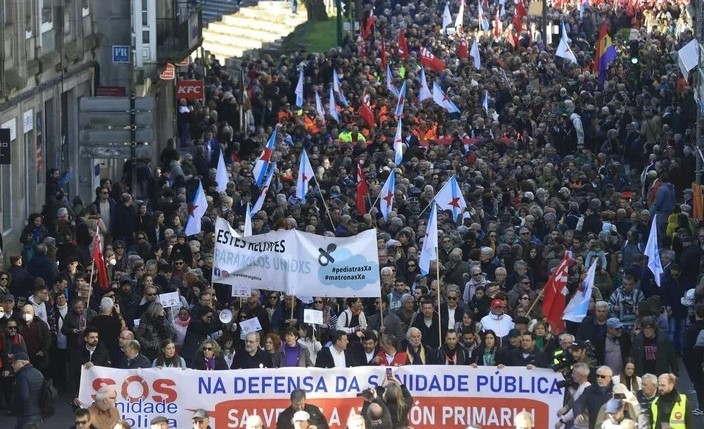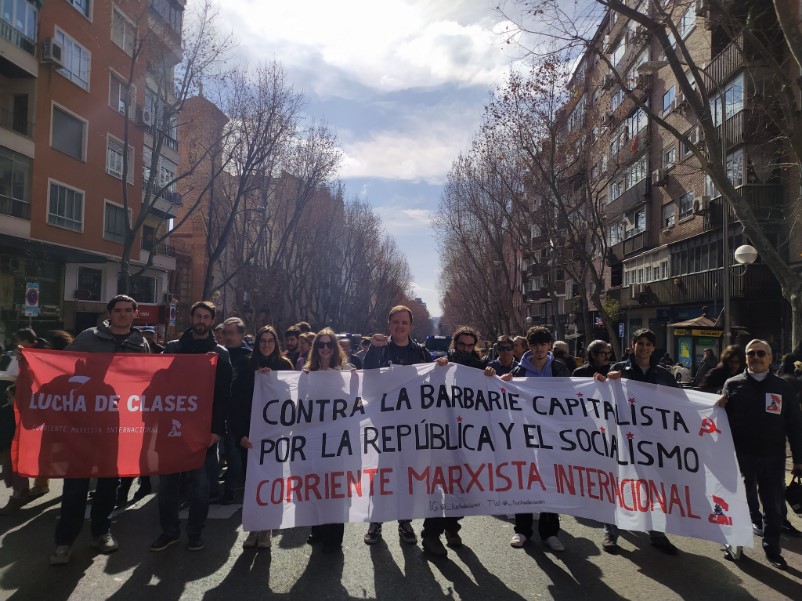
A tide of people flooded Madrid on Feb. 12 in protest against the ongoing collapse of the public health system due to privatization and cutbacks by the right-wing President of the Community of Madrid, Isabel Díaz Ayuso. One million people took part, according to the organizers.
Read the original in Spanish |
The police estimate of 250,000 people was some 50,000 more than in the previous mobilization on Nov. 13. Mass protests also took place in Galicia, and Castile and León—regions also governed by the right.
As in November, four columns of protestors started their march from the North, East, West and South of the capital. The lines of protestors were so long that an hour and a half into the marches, those at the front of the march were already returning from the central meeting point of Plaza de Cibeles, while those at the end had hardly moved.
Meanwhile, tens of thousands of people took to the streets of Santiago de Compostela in Galicia—up to 50,000, according to the organizers—to protest against the health policy of the right-wing regional government. Like its counterpart in Madrid, the government is hell-bent on slashing the public health system. In Burgos, which is also governed by the People’s Party (PP) and Vox, there was a mass protest of 11,000 people against cuts in primary care. Similar protests have been called or announced in Navarre, Aragon and Valencia—these last three regions being governed by the Socialist Party (PSOE).

However, the struggle is taking on its greatest significance and intensity in Madrid. The question is: how did we get here? How did the concerns of working families over Madrid’s public healthcare system result in over a million people taking to the streets in the space of just three months?
One need only look at the deteriorating state of Madrid’s public healthcare system. The average time to obtain a primary care appointment, for instance, has risen to nine days. Madrid is the community with the lowest public health spending per inhabitant. Of the 78 out-of-hospital emergency centres in Madrid before the pandemic, only 24 have opened their doors in the last month (and even then, with insufficient staff). Primary care workers have to attend to up to 70 patients per day (international organizations recommend a maximum of 25 per day). Spending on private healthcare services is constantly increasing. Further figures and examples could be reproduced at will.
We cannot forget the horrific scandal of the 7,291 elderly people left to die in the cruellest conceivable way in the care homes in the first months of the COVID-19 pandemic; nor the scandal of seven construction companies pocketing €160 million for a useless hospital (the Zendal hospital); nor the fact that Ayuso’s brother pocketed €283,000 during the worst of the pandemic for acting as an intermediary in the purchase of masks. All the while, everything resembling a public service has been put under the hammer in waves of privatization. Could we expect otherwise than for this to galvanize a fight against Ayuso and all those who have helped cement her policies?
But it is not just a question of healthcare, nor of blaming a group of villainous individuals for the present problems. This is not merely the fault of incompetent or corrupt politicians, nor does it merely affect Madrid (as the nationwide mobilizations over healthcare showed). Rather, it is the result of pure, unadulterated capitalism, allowed to run wild with no opposition.
But in the last few months, a much-needed fightback has exploded onto the scene, and in the fiercest imaginable way, with the support of the people, the assemblies of the working-class neighbourhoods, and by healthcare workers in struggle. This contempt for Ayuso must be converted (where it has not already been) into contempt for capitalism. Simply bringing Ayuso down would be insufficient. This struggle cannot limit itself to fighting to bring her down alone, but must grow over into a struggle to reverse her policies and advance further from there.
It is a gratifying sight to see this contempt and anger, not only inspiring chants during demonstrations, but reaching a point where hundreds of thousands of working families now see the likes of Ayuso as little more than the parliamentary face of a system that creates endless horror.
These demonstrations show that capitalism has filled the cup of the masses’ anger to the point of overflow. The product is what we see before us: this struggle, being waged by at least 93 neighbourhood assemblies; by health workers (many of whom, like family doctors and pediatricians, have been on strike since November); and by working families, coming out in mass demonstrations like those on Nov. 23, and again on Feb. 12.

The mobilizations must continue. At the end of the Feb. 12 demonstration, further actions were, in fact, announced, including the likelihood of a new demonstration on Sunday, Mar. 26.
Let us bring Ayuso down with the movement in the streets—we have the ability to do so. Working families are fed up and organized. We can do this. Let us continue the struggle until every privatization measure is reversed; until the privately run hospitals are expropriated; until the money that was being funnelled into private pockets is invested in new jobs for healthcare assistants, nurses, doctors, etc., with decent salaries and conditions for all.
Wherever there is a clash of forces on the street, we see the most extraordinary superiority of forces are on the side of the working class, the left and for radical social change, against the ridiculous forces of reaction. It is enough to compare the hundreds of thousands who came out Feb. 12 in Madrid—and all those attending were actually from the Community of Madrid—against the 30,000 or 40,000 that the right-wing PP-Vox-Ciudadanos grouped together on Jan. 22 in the Plaza de Colón, in a mobilization that had been prepared for two months and which drew people from all over Spain!
But this overwhelming superiority of forces in our favour is not just a question of numerical strength, important as that might be. It is also a question of social composition. On one side, we have all that is alive, vibrant and productive in society: the working class, which creates all the wealth and on which the day-to-day functioning of society vitally depends. We have the healthy and enthusiastic youth on our side, and the forces of progress in culture and science. On the other side are the bloodsuckers, the parasites and rentiers; the large, medium and small landowners who live off the labour of others, the reactionary clergy, the oppressors with their truncheons and robes, and all the dark forces of backwardness and ignorance.
The struggle for public healthcare must become the banner that brings the whole working class to its feet—firstly to throw out the right wing, but also as an example of the limits of capitalism and its inability to solve society’s problems. A decent and quality public healthcare system is incompatible with the continued payment of €31 billion by the central government to the banks and vulture funds that profit from the public debt; or with the 48 per cent increase in military spending that we’ve seen since Sánchez arrived at the Moncloa Palace [the prime minister’s residence]; or with the low tax regime that exists for the banks and big business, which starves social spending.
Today we are fighting in Madrid for decent, quality public health care, and to eject Ayuso and the right wing from the government of the Community of Madrid. But there is a deeper problem: capitalist society is set up so that big business and the bankers profit from the labour of the working class, and then we pay even to merely breathe. We must throw them all out.

